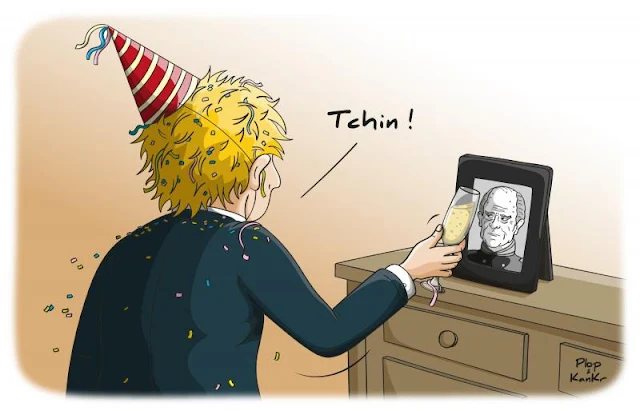Sergio Rodríguez
Gelfenstein, 2/2/2022
Translated by United World International, revised by John Catalinotto
Feb. 2 – It is almost natural that countries (especially the powers that have more capability of doing so), would like to resolve their internal problems by unleashing conflicts abroad. For that, they invent attacks on their national security, exploit false national interests and make absolutist calls for national unity in defense of the threatened sovereignty and integrity.
Who can doubt that the artificial conflict between Russia and Ukraine corresponds to this logic? Especially given the continual and accelerated failure of the administrations of Joe Biden in the United States and Boris Johnson in Great Britain. Biden’s popularity is one of the lowest of any US president at the end of his first year in office.
Ingram Pinn/Financial Times
According to an article published by the Los Angeles Times on Jan. 20, which cites an Associated Press – NORC Center for Public Affairs Research survey, only 43% approve of the U.S. president’s management. In addition, just 28% want Biden to run for re-election in 2024, including only 48% of Democrats. Regarding the economy, the situation for Biden is worse, as scarcely 37% evaluate the president’s management positively. It should be noted that the 2021 inflation rate was the highest in 40 years.
Nor is the popular perception of his handling the pandemic any better, rejected by 55% of Americans. In the same way, it is considered that the government has been totally inefficient in resolving the migration problem and has not even been able to carry out its spending plan in terms of infrastructure and improvement of the economy.
Biden, Johnson failing in polls
In general, people perceived Biden as being unable to build consensus with the Republicans – which was a great promise of his campaign – and he has not succeeded in convincing some of the more conservative legislators of his own Democratic Party to support his program. In this context, citizens wonder what is the point of re-electing Biden, which they see as extending the crisis.
Boris Johnson’s situation is similar. Johnson is being questioned and debated in the midst of a deep political crisis, originating from the leak of an email in which the prime minister’s principal secretary, Martin Reynolds, invited government personnel to a party during full COVID-19 lockdown.
Thus, the leader of the Labor Party, Keir Starmer, has called Johnson to resign, while polls show that 90% of Britons think he should step aside.
Plop & KanKr
In this context, whoever has doubts about the true objectives involved in the development of the “Ukrainian crisis” should listen to Johnson who, after a visit to that country, first apologized for having attended the aforementioned party and then appealed to jingoist sentiment, calling to “concentrate all efforts to confront Russia.” All this, after the Scottish deputy Ian Blackford called on him to agree to be “investigated by the police for violating their own laws.” For her part, the deputy Angela Rayner, the Labor Party’s number two, said Johnson “had to go” immediately.
When another deputy accused him of “ruining the country’s reputation, Johnson responded by saying that: “Our country’s reputation in the world is based […] on the fact that we are able to unite allies to oppose Vladimir Putin. This is what the world is focused on right now and what I’m focused on right now,” making it clear what the real goal of his Ukrainian affair is.
Likewise, by clearly establishing who would die in a possible war between Russia and Ukraine, Johnson stated that: “The best we can do is inform the Russian citizens that the Ukrainians will fight to the last drop of blood.” Simply put, Johnson decided that Ukrainians must die to save him and Biden from a political debacle.
Ukrainian president contradicts Biden
Some unwary reader might think that what I am writing about the situation on the Russian-Ukrainian border is speculation. That reader should read what the Ukrainian authorities say, those in charge of reporting what is actually happening there. Last Friday, January 28, the president of Ukraine, Vladimir Zelensky, warned that the impression is being created in the West that war with Russia is imminent. Ruling out that this will happen, Zelensky lamented at the same time because the terror created around the alleged war is hurting the national economy.




